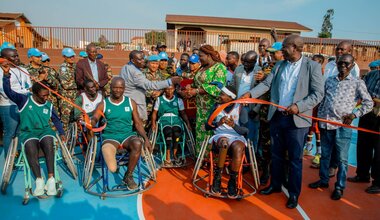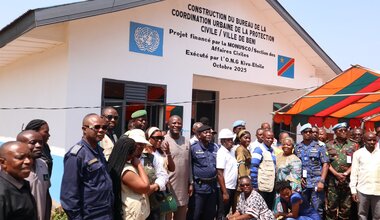Kapalata: Women police officers show determination in reinforcing their capacity
Kapalata, 6 December 2010 – A number of young female recruits with the Congolese National Police (PNC) demonstrate eagerness to increase their operational capacity as they participate in training sessions in Kapalata. Kapalata, a town just outside Kisangani, the capital of Congo's Oriental Province, is where the United Nations Stabilization Mission in the Democratic Republic of the Congo (MONUSCO), is training Congolese National Police (PNC).
The training centre presently hosts 29 female and 464 male police trainees. The training programme, which runs from 20 September 2010 to 13 March 2011, is designed to provide basic technical and professional skills needed to handle issues ranging from judicial policing, public security and general information.
Once they have completed the programme, these young female recruits hope to be able to perform their duties just as well as their male counterparts.
"When we were with our previous armed groups, we were looked down upon," says Solange Masika, a female police trainee and a former member of the PARECO/FAP(Congolese Resistant Patriots/People's Self-Defense Forces) Mai Mai group. "Our commanders doubted our capacity – not to talk about the bullying, abuse and rape suffered by women both within and outside," adds another female recruit, who requested anonymity.
A similar story is told by Modestine Mapendo, an ex-member of the Mai Mai Simba group. "When news about Kapalata reached us in the bush, all of us, men and women, were filled with joy and hope at the prospect of being able to do similar a job but under different and better conditions. This training raised huge expectations among us," she says. She added that one of their main goals is to improve the living conditions of their children and communities. They are also determined, she says, to distinguish themselves by showing that they can do even better than their male colleagues within a modernized and proximity police force."
Another former member of the PARECO/FAP group, Odile Kishingoko, extols the benefits of being trained at the Kapalata centre. Says she: "Though we came from groups that were only recently fighting against one another, today we are all looking in the same direction, thanks to this training."
All the 493 recruits presently in Kapalata are from North Kivu. They are ex-combatants from seven armed groups: CNDP (National Congress for People's Defense); PARECO/FAP (Congolese Resistant Patriots/People's Self-Defense Forces); PARECO/Lafontaine; Mai Mai Ruwenzori; Mai Mai Simba; Mai Mai Kifuafua and UJPS (Union of Young Sacrificed Patriots)
Already they are looking beyond their training period. "We haven't yet been assigned regimental numbers; our ranks are not yet recognized and our future posts not yet budgeted for," they say in unison. Even though this is causing some worry amongst them, they expressed hope that after being trained over such a long period at Kapalata the government endeavor to pay great attention to them by making more space for their absorption into the National Police Force.
The Kapalata project is being funded by Japan's International Cooperation Agency (JICA), run by the United Nations Development Programme (UNDP) and implemented by MONUSCO.
 UN
UN United Nations Peacekeeping
United Nations Peacekeeping






